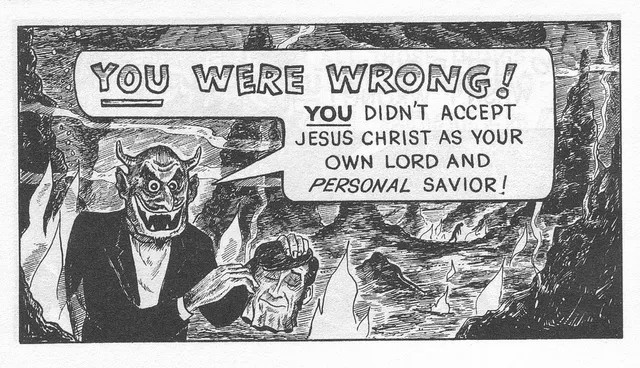An Obadiah Slope column
Crumbs: Spotted in Bondi, the cockatoos being fed, and the pigeons gathering below for the crumbs. Is this a case of “Even the dogs pigeons eat the crumbs that fall from their master’s the cockie’s table?”

###
Chicka Chicka boom: Remember Chick tracts? They were small comic books, about the size of a small mobile phone, with a graphic gospel message in graphic comic book form. The last place Obadiah expected to be reminded of them was on the lefty 99% Invisible podcast.

The last thing Obadiah expected to hear on the pod was the story of a 9-year-old boy reading one, handed to him by a stranger who invites him to read it through and pray the prayer at the end – and then disappear not before telling him to find a good church.
The last outcome Obadiah expected was that the boy, now grown up, would be a Christian. Still.
One billion tracts later, who knows how many people are Christians because of the brazen messages? The one with the devil in the last frame, pictured above, sticks in my mind after decades.
Obadiah wonders what is today’s version of a Chick tract. Has anyone done one on TikTok? Or are there still people handing them out? Let Obadiah know in the Facebook thread if you have seen one recently.
###
Polar opposite: from a progressive direction, Sojourners website carries a piece on why conflict in a church or between churches might be beneficial. “The Christian impulse to seek common ground is based on good intentions,” Hannah Bowman, the founder of a group called Christians for the Abolition of Prisons, writes. “At its idealised best, Christianity is about creating a community characterised by reconciliation and peace. But seeking “unity” in response to polarisation when polarisation is primarily driven by right-wing radicalisation causes our imaginations of what is politically possible to shrink. There isn’t common ground to be found among human rights advocates and right-wing extremists who hold regressive positions on trans lives, systemic racism, and police violence — period. So, what can Christian communities invested in justice and reconciliation do to reframe the “polarisation” conversation?
The Sojourners piece goes on to value what it calls “managed conflict,” that is to say, within an essentially progressive Christian context, and there’s the rub. Bowman suggests that common worship should hold a community together, while “Healthy conflict recognises the reality that many people have to fight for their rights simply because of their existence.”
This is a vision of a church open to the claims of the groups privileged by intersectionality. In Bowman’s case, she believes racial justice implies a need “defund and disempower police,” a call of the American far left.
But conservative Christians, ironically enough, may resonate with Bowman’s following description of church life. However, conservatives might include young people being influenced by transgender ideology among “the poor” and include the spiritually poor.
“Too often, the goal of preserving relationships within a church is used as an excuse for tiptoeing around conflict and avoiding strong but unpopular moral stands. We are told that insisting on taking positions that cause disagreement risks destroying unity and harming relationships within a congregation. But learning how to engage in healthy conflict allows us to embrace conflict as a communal value, strengthening our relationships and pushing us to ‘remember the poor.’ This kind of conflict actually strengthens our relationships with one another.”
###
Australia analysed in an American magazine: Andrew Judd from Melbourne’s Ridley College has a piece in Christianity Today. Writing as a Melbournian in particular, he confesses, “I don’t often like to compare myself with biblical villains—especially not Ahab and Jezebel, two of the wickedest rulers in the Bible. Yet when we read about what God judged them for, the violent entitlement and casual cruelty with which European settlers stole Melbourne sound uncomfortably familiar.”
He takes his readers through the story of Naboth’s vineyard and God’s judgement of Ahab and Jezebel for stealing it. Judd writes: “Those who live, work, and worship on stolen lands are advised to tread thoughtfully. God hasn’t forgotten what happened here in Australia. He has humbled kingdoms greater than ours for less.”
Judd is a conservative evangelical. He shows that the more you take the Bible seriously, the more the history of our country weighs on us.


re Chick tracts: In the states, probably the contemporary version is the on the street viral evangelists in opposing communities/protests being filmed as they are abused by the public. Then the conversation is uploaded to YouTube.
I’m trying to find a good tract that would work for cold situations. We’re past the “Good person looking for a saviour (I’ve done a lot of good things in my life, hopefully I’ll get into heaven, right?), which leads to a penal substitution gospel” to “I don’t know what you think about God, but let me tell you about Jesus, you might be surprised what you may find.” Reluctantly, I’m looking a Matthias Media tracts, because while their wordy, they provide more of the second process of thinking. (Is anyone in control? The other Jesus)
Will love to hear how the tracts work out!